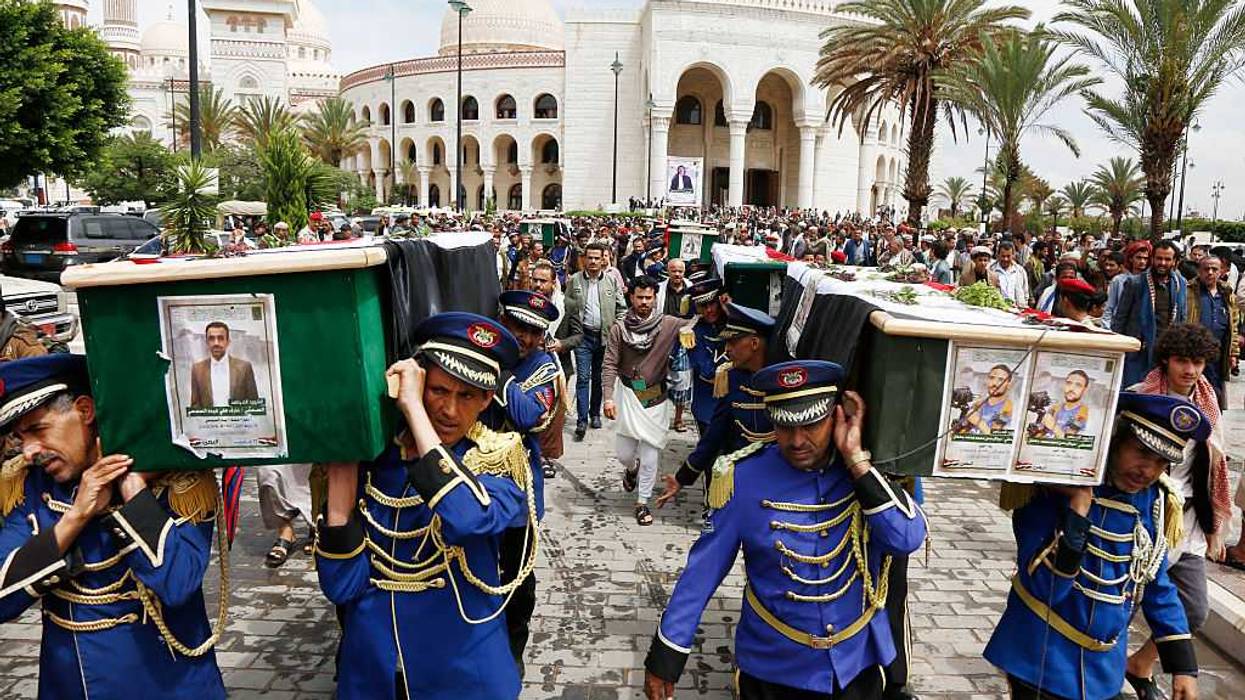As Israeli Forces Seize Final Sumud Boat, Another Flotilla Sails Toward Gaza
"As journalists and medical professionals, we carry the responsibility to speak truth and preserve life," said an Italian surgeon.
As Israeli forces on Friday captured the last remaining vessel from the Global Sumud Flotilla that aimed to break Israel's blockade of the Gaza Strip and deliver humanitarian aid, another group of boats was headed for the Palestinian territory.
The 11 vessels, most of which started sailing last week, are "carrying over 150 healthcare workers, journalists, and activists," according to organizers, the Freedom Flotilla Coalition (FFC) and Thousand Madleens to Gaza.
"As journalists and medical professionals, we carry the responsibility to speak truth and preserve life," said Dr. Ricardo Corradini, a general surgeon from Italy, in a statement. "This mission is an appeal to our colleagues—and to the institutions that represent us globally—to break their silence, uphold their ethics, and stand on the right side of history."
FFC highlighted earlier this week that the ship "Conscience, bombed by Israel off the coast of Malta in May 2025, has returned to serve as a vehicle for medics and media determined to reach their colleagues in besieged Gaza."
Huwaida Arraf, an FFC steering committee member aboard Conscience, said that it "is the latest and largest boat in this historic flotilla—and its name represents not only steadfast resistance to Israel's illegal blockade, but a call to awaken the conscience of the world."
Since Israeli forces began intercepting Global Sumud Flotilla vessels late Wednesday, a fresh wave of global protests has occurred. People around the world have repeatedly taken to the streets over the past two years, as Israel has responded to the Hamas-led October 7, 2023 attack by devastating infrastructure across Gaza, including healthcare facilities, wounding at least 169,165 Palestinians, and slaughtering at least 66,288.
Experts warn the true death toll in Gaza is likely much higher. Among the dead are many doctors and nurses—one count, from Healthcare Workers Watch, said at least 1,200 as of February. Israel's killing of Gaza's healthcare professionals continued this week with the death of Omar Hayek from Doctors Without Borders, or Médecins Sans Frontières (MSF).
The Israeli attack that killed Hayek and wounded four others "took place on a street where our teams were waiting to take a bus to the MSF field hospital in Deir al-Balah. All staff were wearing MSF vests, clearly identifying them as medical humanitarian workers," the group said Thursday. "We express deep sorrow and outrage over the killing, which occurs less than two weeks after another MSF colleague, Hussein Alnajjar, was killed by the Israeli forces, in Deir al-Balah."
Also among the dead are over 200 journalists, with recent tallies ranging from 223 to 270. The Israeli government has prevented international reporters from entering Gaza—and has been widely accused of intentionally killing Palestinian journalists who have reported on the genocide while trying to survive it.
Global press freedom groups have frequently spoken out against Irsael's treatment of journalists, including this week, when Israeli forces took members of the media into custody while blocking the Global Sumud Flotilla from reaching Gaza.
"Arresting journalists and preventing them from doing their work is a serious violation of the right to inform and be informed," said Martin Roux, head of the Crisis Desk at Reporters Without Borders, or Reporters Sans Frontières (RSF), in a Thursday statement.
"RSF condemns the illegal arrest of the news professionals who were on board these ships to cover a humanitarian operation of unprecedented scale," Roux continued. "The Israeli army, which has killed over 210 Palestinian journalists in the Gaza Strip, is continuing its media blockade of the Gaza Strip with these illegal arrests at sea, with the obvious goal of covering up the crimes it is committing against the Palestinian population. RSF urges Israel to respect the status of journalists, protect them, and guarantee their safety in accordance with international law."
Early Friday, the flotilla announced on Instagram that "Marinette, the last remaining boat of the Global Sumud Flotilla, was intercepted at 10:29 am local time, approximately 42.5 nautical miles from Gaza."
According to the flotilla, whose more than 450 members included politicians, actors, and activists from dozens of countries:
Over 38 hours, Israeli occupation naval forces illegally intercepted all 42 of our vessels—each carrying humanitarian aid, volunteers, and the determination to break Israel's illegal siege on Gaza.
Marinette sailed forward with the spirit of sumud—steadfastness—even after seeing the fate of 41 boats before her.
But this is not the end of our mission. Our determination to confront Israel’s atrocities and stand with the Palestinian people remains unshaken.
As people rise up in cities worldwide to demand an end to these horrors and to take a stand for humanity, we rise together with one voice.
We will not stop until the genocide ends. We will not stop until Palestine is free.
Until the interception, the flotilla faced repeated attacks widely believed to be from Israel, whose Ministry of Foreign Affairs on Friday continued to smear the peaceful humanitarian mission as the "Hamas-Sumud provocation" and a "sham."
"Already four Italian citizens have been deported. The rest are in the process of being deported. Israel is keen to end this procedure as quickly as possible," the ministry said on social media. "All are safe and in good health."
In a Friday statement about the Global Sumud Flotilla, Nihad Awad, national executive director of the Council on American-Islamic Relations (CAIR), the largest Muslim civil rights group in the United States, said that "the detention of these humanitarian volunteers, including American citizens, is deeply troubling and completely unacceptable."
"These are civilians engaged in delivering essential aid to people in desperate need in Gaza," he continued. "Denying them legal counsel, holding them incommunicado, and putting them at risk for simply performing humanitarian work is a flagrant violation of human rights and the principles the United States stands for. We urge the US government to act immediately to secure their safe release and make clear that targeting Americans performing humanitarian missions will not be tolerated."
Under President Donald Trump and his Democratic predecessor, the United States has provided Israel with diplomatic support on the global stage and billions of dollars in military aid. Joined at the White House on Monday by Israeli Prime Minister Benjamin Netanyahu—who is wanted by the International Criminal Court—Trump unveiled a proposed peace plan for Gaza.
In a long post on his Truth Social platform Friday morning, Trump railed against Hamas and gave the group that has governed Gaza for the past two decades until Sunday at 6:00 pm Eastern Time to agree to his proposal. Trump wrote, "If this LAST CHANCE agreement is not reached, all HELL, like no one has ever seen before, will break out against Hamas."



